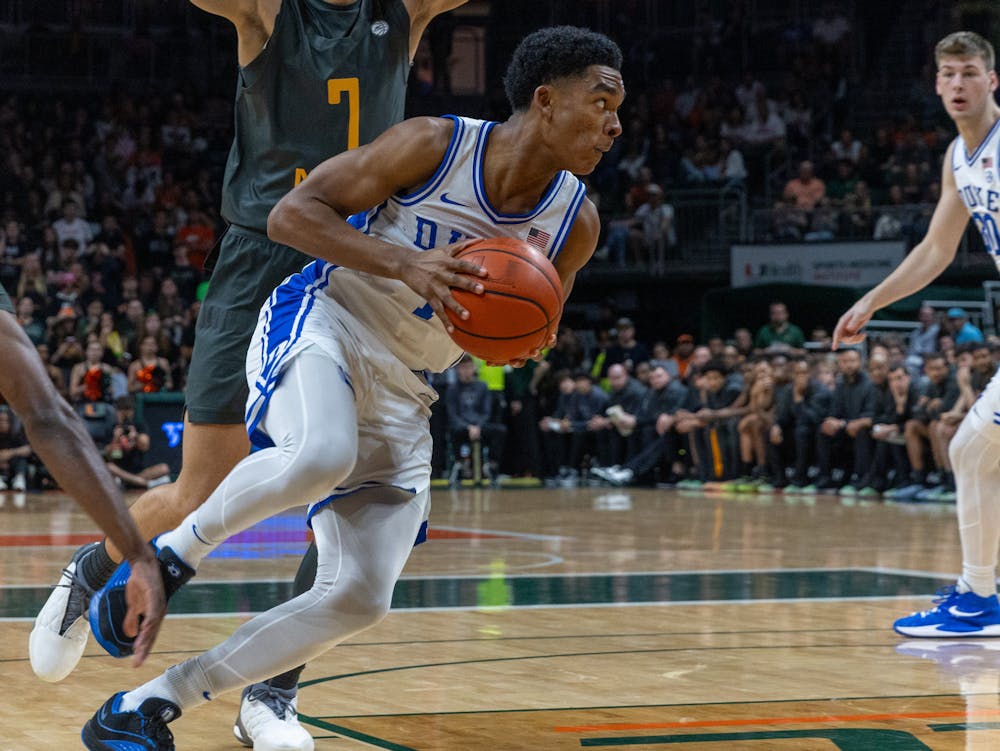By most metrics, next season’s Blue Devil team looks to be dominant.
With a historic recruiting class featuring a potential frontcourt trio of Isaiah Evans, Cooper Flagg and Khaman Maluach, it is no wonder that ESPN ranked the squad from Durham first in its “Way-Too-Early Top 25.” Optimism amongst fans is peaking, even with a national title seemingly the expectation year in and year out for Duke.
However, the assembled group is not seamless. After a cascade of transfers out of the program, the Blue Devils are looking thin at one area in particular — the guard position. At the time of writing, there are only two guards officially listed on Duke’s roster, rising sophomore Caleb Foster and rising junior Tyrese Proctor.
Granted, those are far from the worst options for the Blue Devils to have in their backcourt. Both will come into next season as veterans and potential captains. Both have shown their ability to stretch the floor at times with their shooting skills. The two are very capable ball-handlers, and Proctor in particular has proven his two-way ability with good passing and excellent on-ball defense. Additionally, both are taller guards who can contribute well to an already-large lineup in a change of pace from the 2023-24 season.
On the other hand, Foster and Proctor have shown their flaws. The former will need to improve his efficiency at the free-throw line — for a 40.6% 3-point shooter, 68.8% from the charity stripe is surprisingly unproductive. Additionally, his defense, which has never been a strong suit for the Harrisburg, N.C., native, needs improvement in year two. According to CBBAnalytics, Duke was 8.2 points worse per 100 possessions on defense when Foster played compared to when he sat.
Proctor, meanwhile, failed to achieve the All-ACC expectations he faced coming into his second year. While the Australian improved his 3-point shooting to a respectable 35.2% mark, he was inconsistent. In February, he shot an unimpressive 29.4% from beyond the arc, and in Duke’s NCAA tournament exit against N.C. State, he missed all five of his 3-point attempts. His season averages of 10.5 points and 3.7 assists certainly are not bad numbers, but Proctor fell short of becoming Duke’s ideal point guard. Indeed, Foster increasingly took on a more facilitation-heavy role as the season went on, resulting in Proctor coming off the bench as the sixth man until Foster went down with a stress fracture.
On the note of Foster’s ankle ailment, injuries could also be a concern for Duke’s two-guard roster, as both missed games with injuries this past season. Jared McCain, Jeremy Roach and at times Jaylen Blakes supported the Blue Devils well when Foster or Proctor were out, but these three have announced their intention to leave Duke through the NBA draft or transfer portal. As of now, if Duke were to be without one of the two, the Blue Devils would be in trouble.
As far as depth goes, the two “guard-like” incoming recruits — Darren Harris and Kon Knueppel — may be asked to take up the one or two when Foster or Proctor rest. Harris and Knueppel are renowned for their shooting abilities, and have been known to leverage that with creating good looks for their teammates. However, neither are particularly capable defenders, all the more important if Proctor were to go down. Most importantly, both would be playing out of position at the guard role. Head coach Jon Scheyer was able to play frontcourt stars Mark Mitchell and Kyle Filipowski up a position for this past season, but not ideally. Moving a forward to the guard spot is also especially complex given the facilitation responsibilities of the backcourt position.
Regardless of whether the Blue Devils can recruit guards in the transfer portal or if Harris and Knueppel adjust to the guard role well, I am highly optimistic about next year’s campaign. Duke’s projected starting five of Proctor, Foster, Evans, Flagg and Maluach can contend with any in the nation, and it seems Scheyer has the program headed in the right direction.
However, every great frontcourt and big man needs facilitators in the backcourt to step up. That much is evident in Blue Devil lore — Christian Laettner needed a steady guard like Bobby Hurley in the 1990s just as much as Zion Williamson needed Tre Jones in the 2018-19 season.
For Duke to reach the mountaintop next season, its backcourt must be solidified, whether through the portal or from within. If it can do so, the third season of the Scheyer era could just be the best one yet.
Get The Chronicle straight to your inbox
Signup for our weekly newsletter. Cancel at any time.

